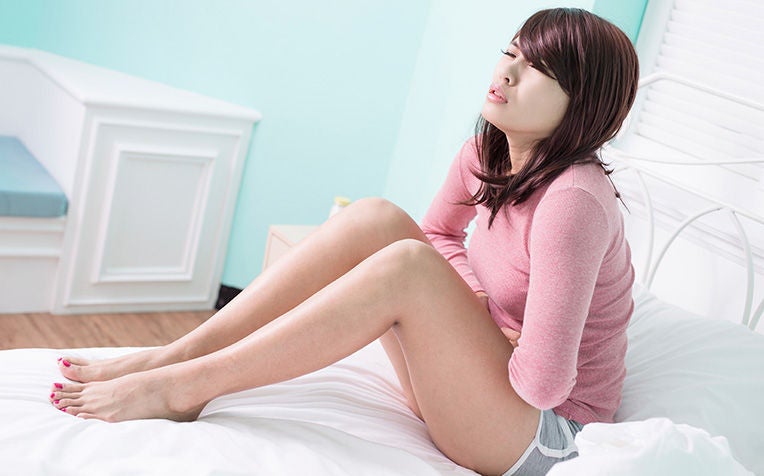
Menstruation The menstrual cycle is designed for reproduction, but it also brings pain and problems for many women and their partners.
It was once believed that the presence of menstruating women can spoil milk and meat, and should not be allowed in the kitchen. More extreme is the belief that menstruating women are unclean and should be banished from the home during that time. While few cultures now consider menstruation as something impure, the monthly bleeding – a result of the lining of the womb breaking down after pregnancy fails to occur – remains a curse for many modern women.
Menstrual problems are common in very young or old women
Heavy menstrual flow is a typical complaint, although some women can suffer from prolonged, irregular, infrequent or erratic periods. For many women, having the period can also be accompanied by mood swings, vomiting, diarrhoea, stomach cramps or pain, lethargy, bloating, weight gain or even food cravings.
“Period problems typically occur in the very young or old,” said Assoc Prof Yong Tze Tein, Head and Senior Consultant at the Department of Obstetrics and Gynaecology, Singapore General Hospital (SGH), a member of the SingHealth group.
“For girls who have begun menstruating, it’s almost like a new factory starting to get into production. They may initially have irregular cycles that usually improve when the ‘factory’ gets more efficient. Sometimes, they may get period pain which lessens as they grow older.”
Women in their late 40s or early 50s often experience irregular, heavy or prolonged periods, or spotting in between periods, as a result of hormonal changes brought about by impending menopause.
| Teens | 30s | 40s | Late 40s/ Early 50s |
|---|---|---|---|
| May experience irregular cycles or pain | May be prone to growths in the womb or ovaries, which can result in heavy bleeding or pain | May develop fibroids or cysts which can result in heavy bleeding | May experience irregular, heavy or prolonged periods, or spotting in between periods |
When they reach their late 30s, women become more prone to growths in the womb and/or the ovaries. They may develop fibroids, which are solid benign tumours that grow from the muscle of the womb; or adenomyosis which occurs when the lining of the womb infiltrates its muscular wall. Endometriotic cysts, or blood cysts, are thought to result from the reversed flow of the menstrual blood through the fallopian tube into the pelvic cavity and ovaries. Fibroids are more common, with one in five women likely to have it at some point, said Assoc Prof Yong.
Some women may lose so much blood that they become anaemic. “They are usually in their 40s, but don’t think about seeing a doctor. Instead, they may wear two or more (sanitary) pads or even disposable baby diapers, and use a plastic sheet on their bed to avoid staining. But they may lose so much blood that they end up needing a blood transfusion,” said Assoc Prof Yong.
Doctors usually prescribe drugs to reduce the blood flow, or painkillers for pain if sufferers are found to have little or no problem. But if they are found to have fibroids or cysts, an operation to remove them is likely to be an option.
Treatment for heavy periods
The average uterus has a diameter of about 60mm – about the size of an egg – but it can become enlarged by fibroids or cysts. One patient, said Assoc Prof Yong, had a womb that was as large as that of a fivemonth- pregnant woman. The condition, unusual for someone so young, caused the woman who was in her early 20s to have very heavy periods. On an overseas trip, she was so desperate to stop the blood flow that she combined two types of medicine, including one that promoted clotting.
But she developed a blood clot in the leg, a potentially fatal condition known as deep vein thrombosis. To dissolve the clot, doctors gave her blood-thinning medication, but the treatment took her back to square one – heavy menstrual bleeding. Eventually, doctors had to resort to blocking the blood vessels that supply her womb, a procedure known as embolisation. This caused the bleeding to stop and her womb to shrink, but she eventually had to have her womb removed.
Removal of the womb or hysterectomy is now much less common than before, both in Singapore and worldwide. This is because there are more options to manage heavy periods. Mirena – an intrauterine contraceptive device that releases progestogen, a hormone that makes the lining of the womb thinner and bleeding lighter – is an alternative. Mirena has FDA approval and is the first line of treatment for heavy periods, said Assoc Prof Yong.
“Adenomyosis and fibroids are benign conditions. If you have an enlarged uterus but a normal period, there is no need to have any treatment,” Assoc Prof Yong said. “But we don’t believe women should suffer from their periods. If they have heavy or painful periods, they should seek treatment,” she added.
Ref: T12
Contributed by

















 Get it on Google Play
Get it on Google Play